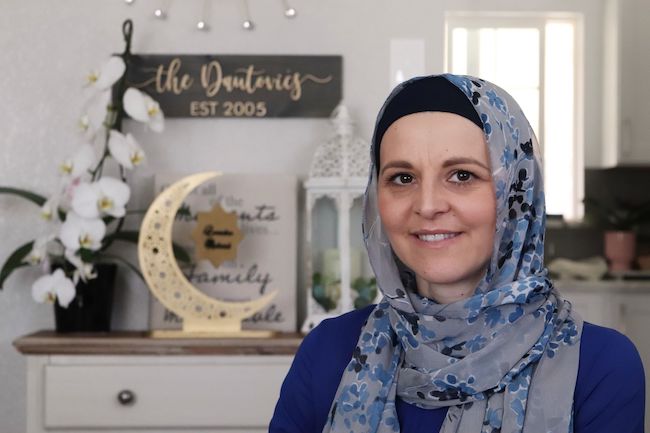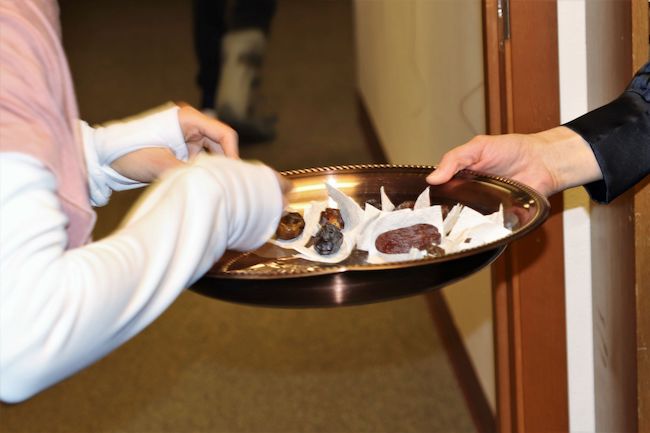Spokane’s Islamic Community of Bosniaks Celebrate Ramadan Together for the First Time Since COVID-19 Restrictions
This news story was made possible by contributions to FāVS from readers and members like you. Thank you.
The Dautovic home on Spokane’s South Hill is decorated for Ramadan in ways akin to other families and how they adorn their homes for their holidays.
Outside the front door, two signs greet the visitor: one that says “Hello” and another that reads “Ramadan Mubarak,” which means “Blessed Ramadan” – a greeting used to wish Muslims well during their observance of this month and its traditions.
As one steps into the home, they immediately see two large banners to their left, each displaying vertically one word of the same phrase “Ramadan Mubarak,” along with other Muslim-themed décor.
“Ramadan brings such a peaceful feeling to everybody’s hearts, and I can guarantee you that every Muslim that you meet down the road, they are like so excited about Ramadan,” said Venesa Dautovic. “As much as people are excited for Christmas, you know, this is our Christmas kind of time.”
Ramadan began on Friday, April 2, and continues through Sunday, May 1. Each year Ramadan starts on a different day, and each year, Muslims savor this time of fasting, praying and breaking the fast with others after the sun sets.
Muslims spend this time of the year growing in their spirituality – by praying more or learning to read the Quran in Arabic, for example – and increasing their good deeds to their communities for more rewards from Allah.
The Islamic Community of Bosniaks in Spokane, to which Dautovic and her family are members, are able to meet in-person for the first time since COVID restrictions began more than two years ago.
Instead of meeting every night for their iftars (the meal eaten by Muslims after sunset during Ramadan), which is more common, they are meeting at the FāVS Center every Friday and Saturday to break the fast with other members. They also gather to pray the Magrib, or “sunset,” prayer, which is one of the five mandatory daily prayers Muslims perform.
They also added an “Omladinski Iftar,” for Sunday, (April 24), from 7:30 p.m. Younger couples and youth, ages 13 and up, gather with their invited friends to break their fast, pray and enjoy a meal together.
Bosnian-born Dautovic says Ramadan is a special month for Muslims because this was the time the Quran was given to Prophet Muhammad. And being able to celebrate Ramadan in America with other Bosnian refugees keeps her children and other Bosnian youth aware of their history and why they had to flee their homes during the Bosnian War.
“We are really blessed and just having all of our people coming together and just trying to keep our culture alive and our language alive,” said Dautovic. “Like teaching our kids what happened to us, just to know history, not to spread hate, God forbid, that’s not our goal. We just want them to know what we went through.”
Specifically, she wants her children to be aware that while they can feel very blessed to be able to worship freely in a non-Muslim country, there was a time when they could worship similarly in Bosnia before their own neighbors attacked and killed them because of their Muslim faith, says Dautovic, a fear that still is not very far from her mind.
“That could possibly happen anywhere,” Dautovic said.
This fear, however, doesn’t stop her from worshipping her faith freely in Spokane and inviting others to come experience an iftar and Muslim prayers with them. She says all people are welcome to their gatherings and can find out how by sending a message to the group through the ICBS’ Facebook page.
Each iftar starts with the community bringing a halal dish (for example, one that doesn’t contain any forbidden foods, such as pork or alcohol) into the FāVS Center kitchen. As they wait for the official sunset time, someone passes out dates and water bottles to each person.
At sundown, a man, more than likely Venesa’s husband, Enes Dautovic, who is the president of the ICBS, makes a call to prayer, known as Azan.
After the call, everyone breaks their fast by eating their date and sipping their water. Then, they situate themselves on clean rugs that point to northeast toward Mecca and perform the Magrib prayer together.
Most evenings, Nezar Hussain volunteers to lead the community in this prayer. He is from Egypt and Arabic is his native tongue. He also knows what he calls classical Arabic, which is what Muslims use during their prayers.
Dautovic and her community call him their Bosnian son-in-law as he is married to one of their members. He adds he feels “super welcomed” by them.
“It’s great to be able to get with people again because you missed the community,” said Hussain.
After the Magrib, the community then eats the dishes that are brought to share, many of them Bosnian-made.
While Dautovic admits it has not always been easy to be a Muslim in America, she says being able to celebrate Ramadan with her fellow Muslims makes her grateful.
“Being able to actually practice your religion somewhere that’s not an Islamic country is amazing,” said Dautovic.
This news story was made possible by contributions to FāVS from readers and members like you. Thank you.










